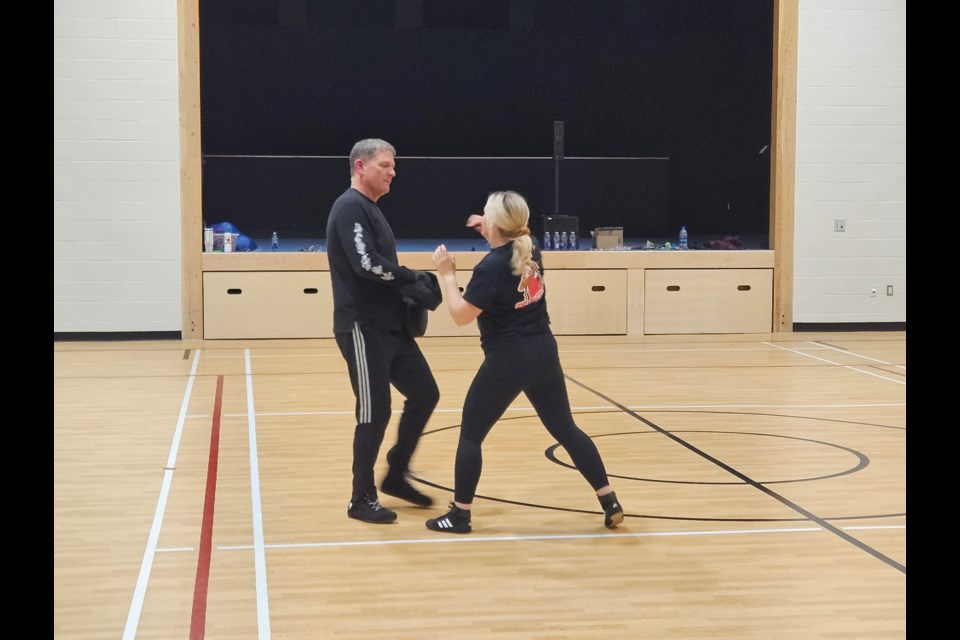BIIGTIGONG NISHNAABEG FIRST NATION — It was an educational week for youth, adults, and Elders alike in Biigtigong Nishnaabeg First Nation.
Biigtigong Nishnaabeg held its Community Safety Week from May 5-8 to educate members — particularly young women and girls in the community — about ways to keep themselves safe when presented with danger.
The four-day schedule of events began with a ceremony in honour of missing and murdered Indigenous women and girls on May 5 (National Day of Awareness for Missing & Murdered Indigenous Women and Girls and 2SLGBTQI+ people), followed by presentations about MMIWG, human trafficking, and a self-defence workshop for women and girls.
Dougall Media attended the presentation about human trafficking on May 6 and caught up with Const. Jolene Michano of the Anishinabek Police Service to discuss the goal of Community Safety Week.
Michano is the APS representative who sits on the safe communities committee, a group dedicated to developing programs and presentations for community members in order to promote/support their safety.
She echoed comments made by Debi Bouchie, Biigtigong Nishnaabeg’s chief executive officer, in regards to how important it is to educate community members about personal safety ahead of an influx of transient workers expected to move into the area as Generation PGM’s copper-palladium mine nears construction.
“Part of our reasoning for developing this committee is that, in our area, there are mines that are already up-and-running and another one coming in - that’s going to bring an increase in workers from everywhere. We don’t know where those workers are coming from so we want our members to be safe,” she said.
Michano said the list is “endless” in terms of potential risks community members face, including an increased presence of drugs, alcohol, theft, human trafficking, and sex trades.
“We’re really looking out for our Indigenous women living in community, especially with the increased presence of males that may be coming to our community - we don’t know what kind of background they have, we don’t know where they’re coming from. We want our members to just be as safe as they can and give them the knowledge to prepare themselves in case they’re in a situation.
"We don’t know what dangers they may face but we want to do as much as we can to help keep them safe,” she said.
Going forward, Michano said the APS is hoping to increase their presence in Biigtigong Nishnaabeg, host more presentations/workshops, and introduce new initiatives to keep community members safe and aware.
One such initiative is the Helping Everyone Locate Protection (HELP) committee, which functions similarly to the Block Parent program found in municipalities across Ontario.
HELP was designed to facilitate further partnership between community members and the APS, giving residents more options to keep themselves and others safe.
“The HELP committee is a safe home for anybody who is in trouble - especially youth and elders - to go to in case they’re in an emergency situation,” Michano said.
Florinda Christianson, who described herself as a “very active” volunteer for the HELP committee, also spoke to Dougall Media about the mechanics of HELP and how members of Biigtigong Nishnaabeg First Nation can utilize the program once it starts.
She noted that, much like the Block Parent program, specific houses will be designated with a HELP decal placed in their windows to make safe spaces easily identifiable.
“If there’s a child or an elder who is in a scary situation . . . or you come across someone who needs help, they would go to the home, knock on the door, and say, ‘I need help.’ If you feel that you’re in danger or you need some assistance, definitely go to a home that has the decal on it and they will be able to assist you,” Christianson said.
She added the HELP committee is still finalizing which homes in the community will be HELP-certified.
The committee plans to release a map to community members once they’ve confirmed the list of homes.
She also said the HELP committee has training workshops and materials they will be providing to HELP-certified homeowners to prepare them for their new role in the community.
“They will be doing an orientation and we will run some scenarios that will help them assist others. We do have a manual that goes through some of the scenarios as well - and we shot a TikTok video we will be presenting at the school,” she said.
HELP-certified homeowners register for the program by contacting Michano and the HELP committee, at which point they are asked to complete a vulnerable sector check before moving forward with the process.
At present, there are around 23 homes in the community, which have applied for the HELP program.
Christianson said the program will officially launch once they’ve completed the application/training process with five of the 23 homeowners.
“It’s a really great program and I’m going to be out looking for more applicants. The more homes we have, the safer our community is - I’m very passionate about the community, it’s my home, and I think having something like this is only going to benefit us in the long run,” she said.
